To use or not to use toners? The debate around toners remains as lively as a daytime talk show among skincare enthusiasts. On one hand, some swear by toners for their ability to balance the skin’s pH, remove traces of cleanser, and set the stage for whatever else you put on your face. On the other hand, others consider toners to be a useless product in their skincare routine. They point out that modern cleansers and moisturizers are well formulated, reducing the need for additional products.
But believe it or not, these beauty items have been around for centuries. In ancient times, people would use vinegar and rosewater to tone their faces. But today, toners come in all forms and sizes, from hydrating toners to exfoliating and purifying ones. And let’s not forget the alcohol-based astringent toners of the past that have now evolved into more gentle formulations. So from the vast options available, which ones are really beneficial for you? Here’s a brief overview of the different types of toners. With our guide, you’ll be able to select the perfect formula for you and feel more confident when adding a toner to your beauty routine.
Types of toners
- Hydrating Toners: Hydrating toners are water-based, usually lightweight, and pack humectants like hyaluronic acid, glycerin, and aloe vera, which relieve dryness and revitalize the skin without leaving it feeling tight. Hydrating toners are suitable for everyone but work best on dry, dehydrated skin.
- Exfoliating Toners: This kind of toner uses exfoliating agents like glycolic and salicylic acids and fruit enzymes to shed off dead cells and other impurities from the skin. Unlike chemical peels, exfoliating toners are gentle enough for daily use and perfect for surface-level exfoliation that provides more effective cleansing than traditional face washes. They work to give dull skin an extra glow and smooth texture, unclog pores, and fade blemishes.
- pH-balancing Toners: Most facial toners fall into this category. They’re formulated at a neutral pH of 5-7 to balance the skin’s natural pH level (around 5), which is often disrupted by harsh cleansers, environmental factors, and other products. When the pH level is balanced, the skin can better retain moisture, resist bacteria and other harmful microorganisms, and maintain a healthy barrier function. These toners usually contain ingredients that are mildly acidic, such as chemical acids, witch hazel, tea tree oil, rose water, and apple cider vinegar, to restore the acid mantle and recalibrate the skin’s pH.
- Brightening Toners: Some toners can promote bright and luminous skin. These are made with glycolic acid, vitamin C, licorice root extract, niacinamide, and other botanical extracts. They’re best for addressing uneven skin tone, dark patches, post-acne marks, and sun-damaged skin.
- Purifying Toners: They remove excess oil and cleanse the pores more profoundly than other toners. These usually contain ingredients with antibacterial and anti-inflammatory properties, like tea tree oil, witch hazel, zinc, and allantoin, as well as ingredients that dissolve bacteria and sebum within the pores, like salicylic acid. Purifying toners are often preferred by people with oily skin prone to acne.
- Astringent Toners: Astringent toners were known as harsh products with high amounts of alcohol, effective at drying excess oil and pimples from the skin. But now they come in more diverse, alcohol-free formulas that use natural astringents like witch hazel and willow bark that are gentler and less drying on the skin.
How to pick the best toner for your skin
When choosing a toner, consider not just your skin’s needs but also the products you already use, especially your cleanser. If your cleanser and toner serve the same purpose or contain similar ingredients, they might not offer extra benefits. For instance, if your cleanser exfoliates with chemical acids, it’s not a good idea to use an exfoliating toner afterward. This combination can dehydrate and irritate your skin. Instead, choose a toner that focuses on soothing and hydrating ingredients.
Oily skin
Oily skin needs toners that control sebum production and detoxify the pores without removing moisture. In other words, balance is key.
Exfoliating and purifying toners are the MVPs for regulating excess oil, unclogging pores, and reducing blackheads—common concerns of oily skin. So look out for products made with glycolic, lactic, and salicylic acids. For plant-derived formulas, look out for toners infused with witch hazel or willow bark extract. Remember that these ingredients tend to dry out the skin, so ideally choose a toner that also includes humectants such as hyaluronic acid, glycerin, and panthenol to restore hydration.
Related: 10 Salicylic Acid Toners To Balance Oily Skin
Dry skin
If your skin is dry and tight, head towards hydrating toners packed with moisturizing ingredients. Also, avoid formulas with high concentrations of alcohol and fragrances, as both can dehydrate your skin.
Read: Hyaluronic Acid Toners for Dry Skin
Sensitive skin
If your skin is sensitive, it means that your skin’s barrier is weak, which also means that your skin will be sensitive to whatever you put on it. That said, avoid toners with drying alcohols, fragrances, salicylic acid, or harsh astringents. Instead, nourish your skin with a soothing toner that balances pH levels and strengthens the protective barrier.
Nature-derived ingredients, such as Centella asiatica, aloe vera, rosemary, colloidal oatmeal, green tea, and fermented rice, are your best bet. They are as gentle as can be and work great in soothing skin sensitivity.
Acne-prone skin
Choosing a toner for acne-prone skin is a delicate task. First, avoid formulas that contain alcohol and fragrances. Instead, use a toner made with salicylic acid to reduce blackheads and tea tree oil to kill acne-causing bacteria. Also, look out for hydrating ingredients like glycerin and sodium hyaluronate to restore skin hydration as well as calming ingredients like green tea and chamomile to relieve inflammation and soothe redness caused by acne breakouts. Niacinamide is also a great acne-fighter because it shrinks pores and regulates sebum, which leads to clear skin.
Hyperpigmented skin
Brightening toners made with vitamin C, licorice extract, niacinamide, green tea, or exfoliating acids are a no-brainer if you’re struggling with dark spots and uneven skin tone. They work by acting on the pigment that darkens the skin tone, reducing blemishes, freckles, and other skin discoloration. P.S.: Here are some of our favorite vitamin C toners to brighten your skin.
How to use toners
- Apply the toner on dry skin after cleansing and before treatment.
- Soak a cotton pad with the toning solution until it feels damp, and gently spread the product over your face and neck. Avoid the eye area.
- Follow up with your treatment of choice and moisturizer while the skin is still damp from the toner. Don’t forget to use SPF during the day.
- For a cooling feeling, use a misted toner after you’ve layered all your products.
You ask, we answer
- Are toners really necessary?
No, toning is not necessary to maintain your skin healthy, but it can provide additional benefits that can improve its appearance. Toners work great when used post-cleansing to remove persisting sebum and waterproof makeup residue. Some also work to add extra hydration, while others brighten and smooth texture. Whether or not you use a toner is mostly a matter of preference.
- How often should I use toner?
There is no one-size-fits-all answer to how often you should use toner. It depends on your skin and the type of toner you’re using. If you have oily skin, you might benefit from using a toner twice a day, morning and night, to help control excess oil production and keep your pores clean. On the other hand, if you have dry or sensitive skin, using a toner too frequently can strip too much moisture.
- Can toner be used as a substitute for a cleanser?
While toners can help remove some impurities and residue from the skin, they’re not a substitute for a cleanser. Cleansers are specifically designed to remove dirt, oil, and makeup, while toners are meant to balance the skin’s pH levels and provide additional nourishment. Using toner alone will not thoroughly cleanse the skin, and it’s likely to leave some residue behind.
- What’s the difference between a toner and an astringent?
Toners and astringents are used to remove leftovers the cleanser didn’t wash away. The difference between them is that toners are more gentle and can be used by everyone, while astringents usually contain higher amounts of alcohol that dry out the skin, which is why we’re not a big fan of the latter.
- What’s the difference between a toner and a facial mist?
Toners and facial mists have two different roles. Toners provide extra cleansing and are usually the second step in a skincare routine, while facial mists work to set makeup and refresh the complexion and are used as the last step of the routine.





